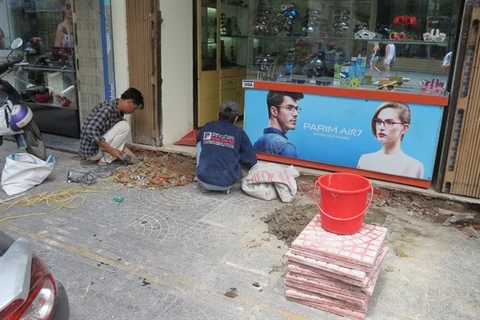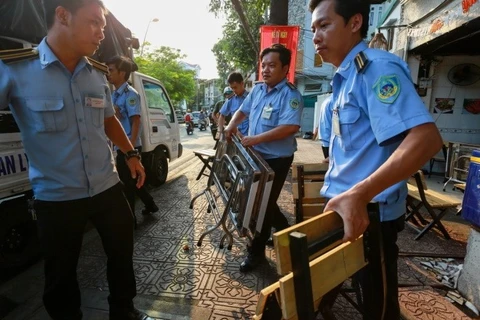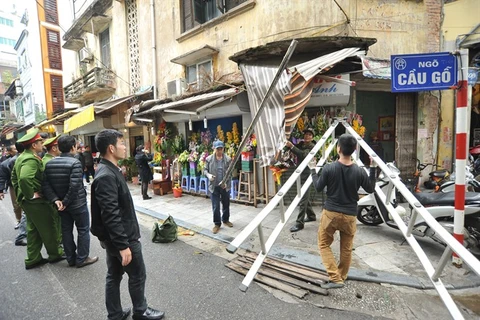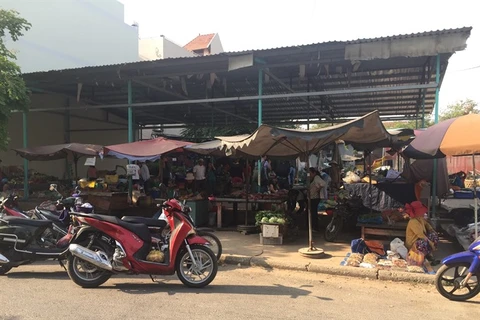 Street vendors sell fruits and vegetables at a ’makeshift’ market on Dong Tac Street, Dong Da district (Photo: VNA/VNS)
Street vendors sell fruits and vegetables at a ’makeshift’ market on Dong Tac Street, Dong Da district (Photo: VNA/VNS) Hanoi (VNS/VNA) - Ambitious plans to establish designated areas for street vendors in Hanoi and Ho Chi Minh City have yet to materialise, months after a “sidewalk clean-up” campaign fuelled debates over the future of street vendors.
In HCM City, after the clean up campaign reached its peak in February and March this year, authorities in some districts eagerly put forward plans for ‘vendor streets’ where street vendors could do business in an orderly manner.
A proposal submitted to the city’s People’s Committee by District 1 designated the sidewalks of Nguyen Van Chiem and Chu Manh Trinh streets and Bach Tung Diep Park for this purpose. These places are said to have spacious pavements with room for both vendors’ businesses and vehicle parking.
Stools, tables and umbrellas for street restaurants would also be provided to avoid obstructing pedestrians, according to the proposal.
In a meeting with city leaders, Chairman of the District 1 People’s Committee expressed his high hope for the plan as a solution to restore public order on pavements and ensure the livelihoods of poor labourers.
District 3 also planned to designate Le Ngo Cat, Ngo Thoi Nhiem and Ho Xuan Huong streets as walking streets and places open for vendor activity in specific hours. However, nearly four months later, no such vendor street exists.
Speaking to the Thanh Nien (Young People) newspaper, a street-food vendor in Bach Tung Diep Park in District 1 said: “I only heard about the plan through the media. We haven’t been informed by authorities.”
According to the Economic Affairs Division of District 1, vendor streets were initially planned to be launched in the second quarter of this year. However, thus far, it is unclear when these streets will open.
Explaining the delay, Doan Ngoc Hai, vice chairman of the district People’s Committee told the Thanh Nien that because the designated areas are in the city centre, the organisation needs to prepare thoroughly and collect opinions from various bodies.
[HCM City plans to clear illegal street markets]
Meanwhile, Vice Chairman of District 3’s People’s Committee Tran Thanh Binh said the district’s initial plan failed as local residents opposed it.
Most residents in the designated areas feared that vendor activity would adversely impact their life, he said.
As a result, the district had to move the plan to an area around Con Rua Lake and is still collecting public opinions on the change of location.
Similar plans in District 4 and District 10 suffered the same fate.
Hanoi authorities, meanwhile, have been trying to move street vendors to local markets. But this plan also seems unfeasible.
Since 2016, the municipal People’s Committee has asked district authorities to eradicate unplanned markets and set up new markets for street vendors in appropriate places.
But across the city, street vendors riding bikes or carrying baskets filled with all types of products are still a common sight.
Ha Anh Tuan, head of Urban Management Division of Dong Da district, said the district has no spare space to build new markets while existing ones are full and cannot accommodate street vendors.
Meanwhile, local authorities that can carry out the plan were met with chilly reactions from street vendors.
Le Thi Huong, a street vendor in Trang Thi Street said she was not willing to move to a market as she will have to pay a monthly fee and she feared her sales would suffer in a new location.
Like Hương, many street vendors believe that if they move to a market, it will be difficult to compete with traders with established businesses in the market.
In fact, since April, the People’s Committee of Thanh Xuan district has provided more than 100sq.m in Thanh Xuan Bac market for street vendors, prioritising those who were forced from the street during the sidewalk campaigns. They were also offered three months free of fee. However, few vendors were willing to relocate.
City-dwellers who prefer hitting the pavement for everything from a bundle of vegetables to a bowl of noodles also helps nourish the street-vendor culture, as it is quicker and more convenient.
“Going to a market requires people to park their vehicles, which costs money and is time-consuming. This is one thing that makes consumers opt street vendors,” said Duong Viet Hung, head of the Economic Affairs Division of Tay Ho district.
To tackle the problem, in implementing a plan to resettle street vendors to Xuan La market in 2018, Tay Ho district authority will offer preferential policies for street vendors to relocate and set up a spacious parking space free of charge in the market, Hung said.-VNA























